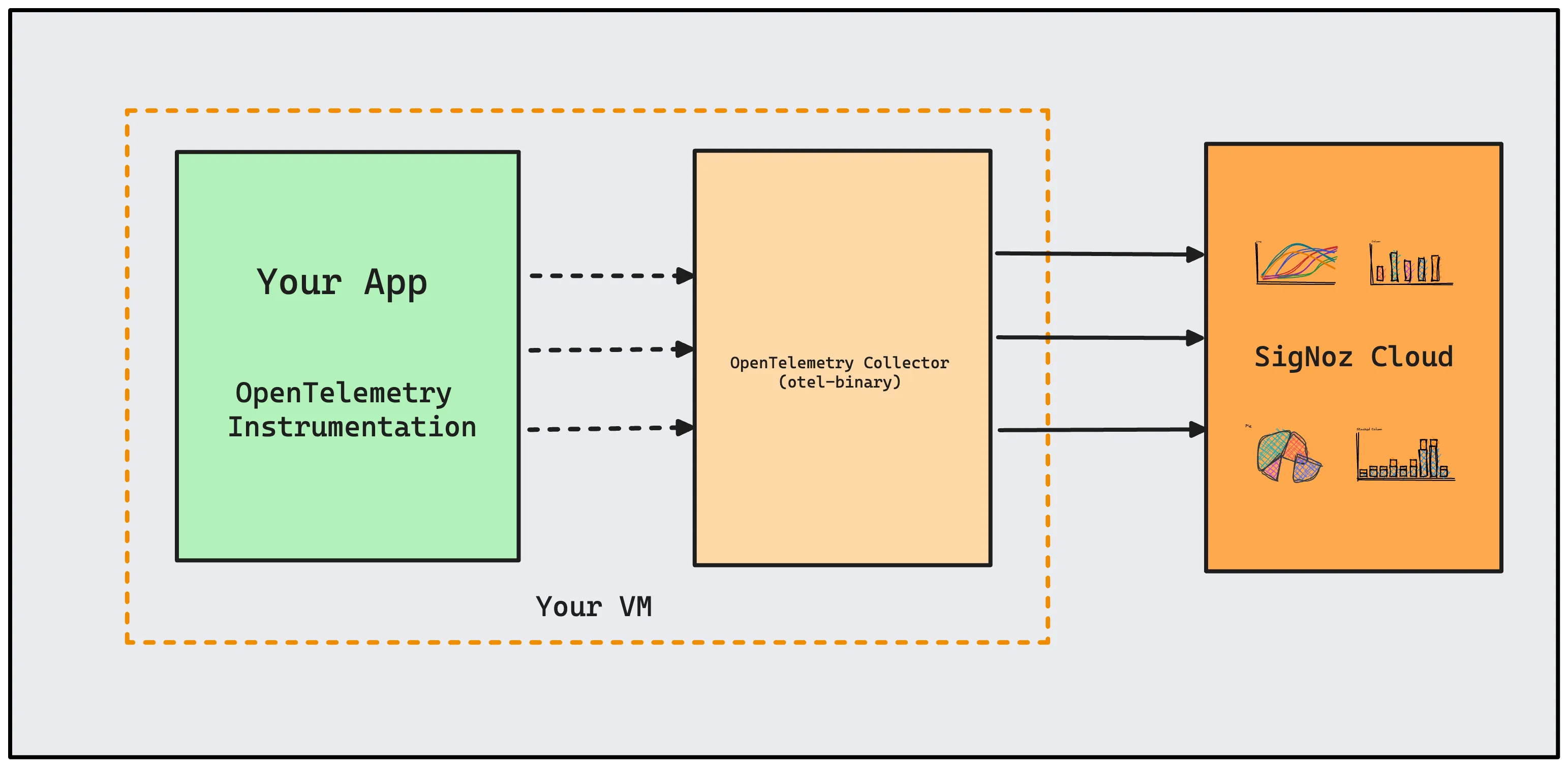OpenTelemetry Binary Usage in Virtual Machine
Overview
This tutorial shows how you can deploy OpenTelemetry binary as an agent, which collects telemetry data. Data such as traces, metrics and logs generated by applications most likely running in the same virtual machine (VM).
It can also be used for collecting data from other VMs in the same cluster, data center or region, however, binary is not recommended in that scenario but container or deployment which can be easily scaled.
In this guide, you will also learn to set up a hostmetrics receiver to collect metrics from the VM and view in SigNoz.
Setup Otel Collector as agent
OpenTelemetry-instrumented applications in a VM can send data to the otel-binary agent running in the same VM. The OTel agent can then be configured to send data to the SigNoz cloud.

Here are the steps to set up OpenTelemetry binary as an agent.
- Download otel-collector tar.gz for your architecture
wget https://github.com/open-telemetry/opentelemetry-collector-releases/releases/download/v0.116.0/otelcol-contrib_0.116.0_linux_amd64.tar.gz
- Extract otel-collector tar.gz to the
otelcol-contribfolder
mkdir otelcol-contrib && tar xvzf otelcol-contrib_0.116.0_linux_amd64.tar.gz -C otelcol-contrib
- Create
config.yamlinotelcol-contribfolder and paste the below yaml configuration code in it.
receivers:
otlp:
protocols:
grpc:
endpoint: 0.0.0.0:4317
http:
endpoint: 0.0.0.0:4318
hostmetrics:
collection_interval: 60s
scrapers:
cpu: {}
disk: {}
load: {}
filesystem: {}
memory: {}
network: {}
paging: {}
process:
mute_process_name_error: true
mute_process_exe_error: true
mute_process_io_error: true
processes: {}
prometheus:
config:
global:
scrape_interval: 60s
scrape_configs:
- job_name: otel-collector-binary
static_configs:
- targets:
# - localhost:8888
processors:
batch:
send_batch_size: 1000
timeout: 10s
# Ref: https://github.com/open-telemetry/opentelemetry-collector-contrib/blob/main/processor/resourcedetectionprocessor/README.md
resourcedetection:
detectors: [env, system] # Before system detector, include ec2 for AWS, gcp for GCP and azure for Azure.
# Using OTEL_RESOURCE_ATTRIBUTES envvar, env detector adds custom labels.
timeout: 2s
system:
hostname_sources: [os] # alternatively, use [dns,os] for setting FQDN as host.name and os as fallback
extensions:
health_check: {}
zpages: {}
exporters:
otlp:
endpoint: "ingest.<region>.signoz.cloud:443"
tls:
insecure: false
headers:
"signoz-ingestion-key": "<your-ingestion-key>"
debug:
verbosity: normal
service:
telemetry:
metrics:
address: 0.0.0.0:8888
extensions: [health_check, zpages]
pipelines:
metrics:
receivers: [otlp]
processors: [batch]
exporters: [otlp]
metrics/internal:
receivers: [prometheus, hostmetrics]
processors: [resourcedetection, batch]
exporters: [otlp]
traces:
receivers: [otlp]
processors: [batch]
exporters: [otlp]
logs:
receivers: [otlp]
processors: [batch]
exporters: [otlp]
- Set the
<region>to match your SigNoz Cloud region - Replace
<your-ingestion-key>with your SigNoz ingestion key
- Once we are done with the above configurations, we can now run the collector service with the following command:
From the otelcol-contrib, run the following command:
./otelcol-contrib --config ./config.yaml
Run in background
If you want to run otel collector process in the background:
./otelcol-contrib --config ./config.yaml &> otelcol-output.log & echo "$!" > otel-pid
The above command sends the output of the otel-collector to otelcol-output.log file and prints the process id of the background running otel collector process to the otel-pid file.
If you want to see the output of the logs you’ve just set up for the background process, you may look it up with:
tail -f -n 50 otelcol-output.log
tail 50 will give the last 50 lines from the file otelcol-output.log
You can stop the collector service otelcol when running in backgorund, with the following command:
kill "$(< otel-pid)"
Test Sending Traces
OpenTelemetry collector binary should be able to forward all types of telemetry data received: traces, metrics, and logs, to SigNoz OTLP endpoint via gRPC.
Let's send sample traces to the otelcol using telemetrygen.
To install telemetrygen binary:
go install github.com/open-telemetry/opentelemetry-collector-contrib/cmd/telemetrygen@latest
To send trace data using telemetrygen, execute the command below:
telemetrygen traces --traces 1 --otlp-endpoint localhost:4317 --otlp-insecure
Output should look like this:
...
2023-03-15T11:04:38.967+0545 INFO channelz/funcs.go:340 [core][Channel #1] Channel Connectivity change to READY {"system": "grpc", "grpc_log": true}
2023-03-15T11:04:38.968+0545 INFO traces/traces.go:124 generation of traces isn't being throttled
2023-03-15T11:04:38.968+0545 INFO traces/worker.go:90 traces generated {"worker": 0, "traces": 1}
2023-03-15T11:04:38.969+0545 INFO traces/traces.go:87 stop the batch span processor
2023-03-15T11:04:38.983+0545 INFO channelz/funcs.go:340 [core][Channel #1] Channel Connectivity change to SHUTDOWN {"system": "grpc", "grpc_log": true}
2023-03-15T11:04:38.984+0545 INFO channelz/funcs.go:340 [core][Channel #1 SubChannel #2] Subchannel Connectivity change to SHUTDOWN {"system": "grpc", "grpc_log": true}
2023-03-15T11:04:38.984+0545 INFO channelz/funcs.go:340 [core][Channel #1 SubChannel #2] Subchannel deleted {"system": "grpc", "grpc_log": true}
2023-03-15T11:04:38.984+0545 INFO channelz/funcs.go:340 [core][Channel #1] Channel deleted {"system": "grpc", "grpc_log": true}
2023-03-15T11:04:38.984+0545 INFO traces/traces.go:79 stopping the exporter
If the SigNoz endpoint in the configuration is set correctly and accessible, you should be able to see the traces sent via OpenTelemetry collector in VM from telemetrygen in the SigNoz UI.
